




Posted in Current Events, Editor's Note with tags Election 2012, Foreign Policy,Governor Romney, President Obama on August 30, 2012 by Ian Pham

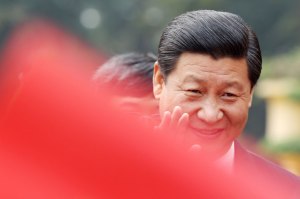 As the presidential race heats up, many of us (or maybe it’s just me) are wondering what the candidates’ stance on China will be. Mitt Romney has already made his ground clear on the matter, pledging to take a tougher position on the PRC as currency manipulators and thieves of intellectual property. From what is shown so far, Governor Romney has taken, or promises to take a hardline stance on the Chinese, and shows no reservation on sparking a “trade war” with the Asian giant. According to Mr. Romney, we won’t be “starting” a trade war with China, we are “already in a trade war” with China.
As the presidential race heats up, many of us (or maybe it’s just me) are wondering what the candidates’ stance on China will be. Mitt Romney has already made his ground clear on the matter, pledging to take a tougher position on the PRC as currency manipulators and thieves of intellectual property. From what is shown so far, Governor Romney has taken, or promises to take a hardline stance on the Chinese, and shows no reservation on sparking a “trade war” with the Asian giant. According to Mr. Romney, we won’t be “starting” a trade war with China, we are “already in a trade war” with China.
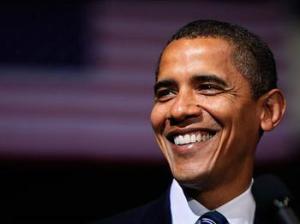 President Obama would quickly learn the hard way that nice guys finish last. After being harassed by the Chinese Navy in the Southeast Asia Sea in 2008 (the Impeccable Incident), snuffed by the Chinese leadership at the Copenhagen Summit in 2009, and the ongoing issue of currency manipulation (just to name a few), the president’s stance on China would take a turn for the strong. After his return from Copenhagen, President Obama would sell billions of dollars in arms to Taiwan, a direct response to the Chinese after Copenhagen. Beijing responded with waves of hostility and harsh words, which the president coyly brushed off.
President Obama would quickly learn the hard way that nice guys finish last. After being harassed by the Chinese Navy in the Southeast Asia Sea in 2008 (the Impeccable Incident), snuffed by the Chinese leadership at the Copenhagen Summit in 2009, and the ongoing issue of currency manipulation (just to name a few), the president’s stance on China would take a turn for the strong. After his return from Copenhagen, President Obama would sell billions of dollars in arms to Taiwan, a direct response to the Chinese after Copenhagen. Beijing responded with waves of hostility and harsh words, which the president coyly brushed off.
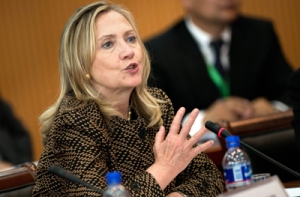 This was just the start, however. In the latter half of 2010, U.S. Secretary of State Hillary Clinton made a statement in Hanoi declaring the Southeast Asia Sea a “national interest” of the United States, a statement that greatly angered the Chinese, who were desperately trying to keeping the U.S. out of Asian affairs. The Obama administration would then release statements saying that as time goes on, the U.S.’s role in Asia would only get bigger. Earlier this year, January 2012, the president would make promises to bring jobs back to America and launch investigations into China’s unfair trade practices. Considering the president’s actions in the past several years, the Obama Administration’s stance has become quite clear.
This was just the start, however. In the latter half of 2010, U.S. Secretary of State Hillary Clinton made a statement in Hanoi declaring the Southeast Asia Sea a “national interest” of the United States, a statement that greatly angered the Chinese, who were desperately trying to keeping the U.S. out of Asian affairs. The Obama administration would then release statements saying that as time goes on, the U.S.’s role in Asia would only get bigger. Earlier this year, January 2012, the president would make promises to bring jobs back to America and launch investigations into China’s unfair trade practices. Considering the president’s actions in the past several years, the Obama Administration’s stance has become quite clear.
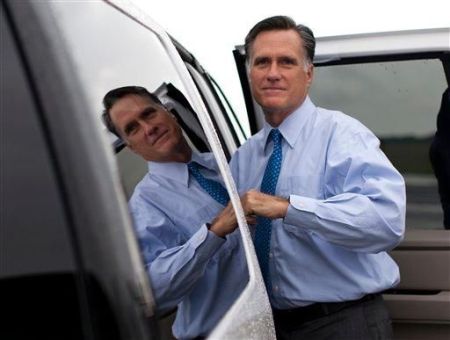 Where does this leave Governor Romney? For now, we can only say that his stance on China looks promising. He has for a long time made strong statements in favor of punishing the Chinese for their poor conduct on the international stage. However, one must be wary of any promises made by politicians. This is a lesson in history. Even President Obama has broken a few promises made during the presidential race (Guantanamo Bay, anyone?). Who knows, it is possible that Mr. Romney will follow through on his promises of punishing the PRC for their disregarding of their colleagues in the world stage. However, it is also a possibility that promises of economic development and favorable trade agreements with China may lure the Republican nominee away from his initial goals. Regardless of which party, instances like this have happened before, and quite frequently in politics.
Where does this leave Governor Romney? For now, we can only say that his stance on China looks promising. He has for a long time made strong statements in favor of punishing the Chinese for their poor conduct on the international stage. However, one must be wary of any promises made by politicians. This is a lesson in history. Even President Obama has broken a few promises made during the presidential race (Guantanamo Bay, anyone?). Who knows, it is possible that Mr. Romney will follow through on his promises of punishing the PRC for their disregarding of their colleagues in the world stage. However, it is also a possibility that promises of economic development and favorable trade agreements with China may lure the Republican nominee away from his initial goals. Regardless of which party, instances like this have happened before, and quite frequently in politics.

 As the presidential race heats up, many of us (or maybe it’s just me) are wondering what the candidates’ stance on China will be. Mitt Romney has already made his ground clear on the matter, pledging to take a tougher position on the PRC as currency manipulators and thieves of intellectual property. From what is shown so far, Governor Romney has taken, or promises to take a hardline stance on the Chinese, and shows no reservation on sparking a “trade war” with the Asian giant. According to Mr. Romney, we won’t be “starting” a trade war with China, we are “already in a trade war” with China.
As the presidential race heats up, many of us (or maybe it’s just me) are wondering what the candidates’ stance on China will be. Mitt Romney has already made his ground clear on the matter, pledging to take a tougher position on the PRC as currency manipulators and thieves of intellectual property. From what is shown so far, Governor Romney has taken, or promises to take a hardline stance on the Chinese, and shows no reservation on sparking a “trade war” with the Asian giant. According to Mr. Romney, we won’t be “starting” a trade war with China, we are “already in a trade war” with China.
What about President Obama? Prior to his presidency, Mr. Obama’s stance on China was neither friendly nor hostile. In the words of the president (before he was president), “They’re [China] neither our enemy or our friend. They’re competitors.” In the same statement, President Obama also stated that his presidential aims were to establish relationships with the PRC and help stabilize the region. From this point of view, the president’s stance in previous years were less cynical, and more optimistic. This optimism however, will change after his inauguration, and a swift change in policy would quickly follow.
 President Obama would quickly learn the hard way that nice guys finish last. After being harassed by the Chinese Navy in the Southeast Asia Sea in 2008 (the Impeccable Incident), snuffed by the Chinese leadership at the Copenhagen Summit in 2009, and the ongoing issue of currency manipulation (just to name a few), the president’s stance on China would take a turn for the strong. After his return from Copenhagen, President Obama would sell billions of dollars in arms to Taiwan, a direct response to the Chinese after Copenhagen. Beijing responded with waves of hostility and harsh words, which the president coyly brushed off.
President Obama would quickly learn the hard way that nice guys finish last. After being harassed by the Chinese Navy in the Southeast Asia Sea in 2008 (the Impeccable Incident), snuffed by the Chinese leadership at the Copenhagen Summit in 2009, and the ongoing issue of currency manipulation (just to name a few), the president’s stance on China would take a turn for the strong. After his return from Copenhagen, President Obama would sell billions of dollars in arms to Taiwan, a direct response to the Chinese after Copenhagen. Beijing responded with waves of hostility and harsh words, which the president coyly brushed off. This was just the start, however. In the latter half of 2010, U.S. Secretary of State Hillary Clinton made a statement in Hanoi declaring the Southeast Asia Sea a “national interest” of the United States, a statement that greatly angered the Chinese, who were desperately trying to keeping the U.S. out of Asian affairs. The Obama administration would then release statements saying that as time goes on, the U.S.’s role in Asia would only get bigger. Earlier this year, January 2012, the president would make promises to bring jobs back to America and launch investigations into China’s unfair trade practices. Considering the president’s actions in the past several years, the Obama Administration’s stance has become quite clear.
This was just the start, however. In the latter half of 2010, U.S. Secretary of State Hillary Clinton made a statement in Hanoi declaring the Southeast Asia Sea a “national interest” of the United States, a statement that greatly angered the Chinese, who were desperately trying to keeping the U.S. out of Asian affairs. The Obama administration would then release statements saying that as time goes on, the U.S.’s role in Asia would only get bigger. Earlier this year, January 2012, the president would make promises to bring jobs back to America and launch investigations into China’s unfair trade practices. Considering the president’s actions in the past several years, the Obama Administration’s stance has become quite clear. Where does this leave Governor Romney? For now, we can only say that his stance on China looks promising. He has for a long time made strong statements in favor of punishing the Chinese for their poor conduct on the international stage. However, one must be wary of any promises made by politicians. This is a lesson in history. Even President Obama has broken a few promises made during the presidential race (Guantanamo Bay, anyone?). Who knows, it is possible that Mr. Romney will follow through on his promises of punishing the PRC for their disregarding of their colleagues in the world stage. However, it is also a possibility that promises of economic development and favorable trade agreements with China may lure the Republican nominee away from his initial goals. Regardless of which party, instances like this have happened before, and quite frequently in politics.
Where does this leave Governor Romney? For now, we can only say that his stance on China looks promising. He has for a long time made strong statements in favor of punishing the Chinese for their poor conduct on the international stage. However, one must be wary of any promises made by politicians. This is a lesson in history. Even President Obama has broken a few promises made during the presidential race (Guantanamo Bay, anyone?). Who knows, it is possible that Mr. Romney will follow through on his promises of punishing the PRC for their disregarding of their colleagues in the world stage. However, it is also a possibility that promises of economic development and favorable trade agreements with China may lure the Republican nominee away from his initial goals. Regardless of which party, instances like this have happened before, and quite frequently in politics.
To put simply, I believe that Governor Romney makes an appealing case against Beijing. If he were to follow through on these promises and not collapse under the many pressures that come with being the most powerful man in the world, then I am all for it. My position on President Obama is that he has proven himself through the various actions outlined above. Furthermore, he has shown much more teeth in dealing with the Chinese than many of the presidents before him. For this reason, and for this particular issue, it seems more likely that our current president, Mr. Barack Obama would handle China in a more effective manner.
Nonetheless, Mr. Romney has made an attractive case in the China issue. If he follows through on his plans, then America will benefit greatly from it. Can Mitt Romney take the presidency from Barack Obama? Besides China, the American economy is a big issue right now, and Governor Romney has made some strong statements about creating work for Americans. Will President Obama be able to counter Romney’s attacks on his business credentials? There is still a long time before election day this November, what do you think?
A brief protest took place on July 1, 2012 before being cracked down by Communist police.
The much anticipated anti-China protest slated for the 1st of July never took place, at least not to the scale that we all expected. Much of this is due to the quick work of the Communist police network, who swiftly barricaded, detained, and blocked many areas and leaders key to the operation. As a result, small scale demonstrations did take place before also being put to bed by the Communist police.
The following Sunday however, July 8, 2012, a modestly sized protest did take place in Sai Gon City. That protest too was suppressed by the Communist police in Vietnam. Vietnamese authorities have been on high alert and placing heavy surveillance on its citizen, especially bloggers and writers. The possibility of large scale anti-China demonstrations keep the Communist Party in a state of fear and paranoia.
In Vietnam, expressing patriotism and love of one’s country is grounds for imprisonment and government retribution. The Vietnamese Communist Party would rather have a safe and cosy relationship with the PRC than its own people. Fears of an angry China have prompted the government in Vietnam to constantly suppress and crackdown on their own people.
There is a saying associated with the Vietnamese Communist Party, “fierce to its people, but meek to the Chinese.” It is quite self explanatory. The Vietnamese Communist Party uses excessive force and expends heavy resources all with the goal of suppressing the Vietnamese population. At the same time, they won’t hesitate to lower themselves to the Chinese Communist Party, for fear of an angry China.
Relations between the U.S. and Vietnam have developed substantially in recent years, though human rights remains an issue in Vietnam.
This can all be demonstreated by the VCP’s constant crackdowns of Vietnamese bloggers, writers, and protest organizers. These individuals have not even expressed anti-Party sentiments. All they’ve done is express love for the motherland and tried to defend her from the invading Chinese.
It is true that the Vietnamese government has passed a law laying claim to Paracel and Spratly, and greatly angering the Chinese. However, the very same government continues to be submissive and dove-like when dealing with China’s assertive claims to the southeastern sea.
When compared to the Phillipines’ government, the Vietnamese Communist Party does not measure up. President Benjamin Aquino III has handled the Phillipines’ situation with China promptly and assertively. Though the military and naval strength of the Phillipines is not up to par with China’s, or even Vietnam’s, the country has shown that they are a force to be reackoned with. As a result, the Filipino citizens are fully in support of their government, with the world also nodding with approval.
The VCP should take a lesson from the Philippines and start standing up to China more sternly. It is true that their strategy of bringing in the U.S. to the matter brings great benefits. However, their constant abuse of human rights and continued spineless approach in dealing with the PRC’s aggression continues to impede the country’s growth. The Vietnamese should take a tougher stance on China, and a more respectable approach in dealing with its own citizens. Only then will true progress be achieved.
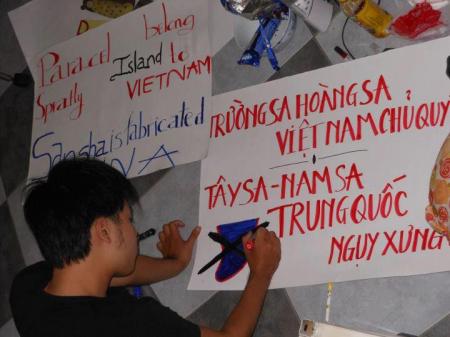 Word has been spreading that the people in Vietnam are ready to stage a major demonstration this Sunday to protest China’s latest act of aggression in the Southeast Asia Sea. The People’s Republic of China has recently offered bids to foreign oil companies to start operating in areas deep within Vietnam’s Exclusive Economic Zone. The Vietnamese government has declared these actions illegal, and in strict violation of Vietnam’s law and sovereignty. Beijing responded by claiming that what they are doing is “normal business activity” and warned Vietnam not to further escalate the situation.
Word has been spreading that the people in Vietnam are ready to stage a major demonstration this Sunday to protest China’s latest act of aggression in the Southeast Asia Sea. The People’s Republic of China has recently offered bids to foreign oil companies to start operating in areas deep within Vietnam’s Exclusive Economic Zone. The Vietnamese government has declared these actions illegal, and in strict violation of Vietnam’s law and sovereignty. Beijing responded by claiming that what they are doing is “normal business activity” and warned Vietnam not to further escalate the situation.
Hanoi cites UNCLOS as evidence against China’s “indisputable” claims of control over the entire Southeast Asia Sea, which Vietnam calls the East Sea. According to Vietnam, the nine offshore oil blocks that China plans to open to foreign firms is well within Vietnam’s EEZ, violating both international law and Vietnamese law. This dispute comes as part of a long standing tension building in the Southeast Asia Sea.
After much silence and hesitation on this issue, Hanoi has finally raised its voice, prompting the country’s National Assembly to pass a law claiming official ownership of the Paracel and Spratly islands. These islands are prominently situated in the Southeast Asia Sea, and have been under Vietnam’s control since the Nguyen Dynasty in the 19th century. China disregards both Vietnam’s historical claims and its claims based on international law. The Asian giant continues to assert its claims over the sea in its entirety, putting the country into conflicts with its many neighbors.
The people of Vietnam came out to protest Red China in the summer of 2011. The weekly demonstrations were permitted by the Vietnamese government for a while, but were formally and forcefully suppressed on the 11th week.
In reaction to the assertions of Red China, the people of Vietnam have come together in preparation for the large demonstration slated for this Sunday. Protests are set to kick off in two of Vietnam’s major cities, Hanoi and Ho Chi Minh (Saigon). This is reminiscent of protests in Vietnam last summer, which were permitted by the government for a time before being forcibly subdued by Communist police. Though it is difficult to predict what the protests will yield, it will become clear on Sunday morning.
For those of us who are outside of Vietnam, there is really not much we can physically do. However, it is important to let the Vietnamese within know that we support them, and that we are behind them in their efforts. Regardless of what country we are originally from or currently live in, Vietnamese everywhere are fighting for the same cause. To all the courageous Vietnamese coming out on Sunday, just know that we all support you. God bless
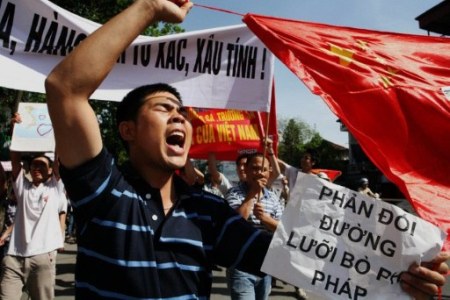 Fresh off the discussions and debate sparked by the previous post, it seems appropriate that we now discuss what is best for Vietnam’s future. First off, it is clear that the old Communist Party, along with their police state apparatus, must go. Whether it be from sweeping reforms throughout the Party, or a flat out ousting of the Party, the old Communist system does not work. The people of Vietnam need freedom, the freedom to express themselves, to share their ideas, and to openly disagree with their government.
Fresh off the discussions and debate sparked by the previous post, it seems appropriate that we now discuss what is best for Vietnam’s future. First off, it is clear that the old Communist Party, along with their police state apparatus, must go. Whether it be from sweeping reforms throughout the Party, or a flat out ousting of the Party, the old Communist system does not work. The people of Vietnam need freedom, the freedom to express themselves, to share their ideas, and to openly disagree with their government.
How do we attain this freedom? There are countless ways. However, regardless of how the people achieve the freedom they require, there are some fundamental principles that need to be present. The most important principle, and I’ve said this countless times, is for the people of Vietnam to be united. Only in unity can Vietnam overcome its many different obstacles. Unity has helped keep Vietnam alive through 4,000 years of Chinese invasion, and two centuries of western invasion.
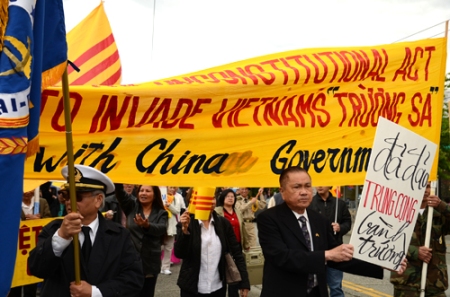 One cannot predict what all the factors will be in bringing change to Vietnam, that will only become clear when the time comes. However, one can rest assured that without unity, all other factors are insignificant. In order to defeat the two goliaths of the Vietnamese people, that is the VCP and the PRC, the people of Vietnam must stand together. As one unitary force, unfettered by fear or self-interest, the people of Vietnam will defeat these two enemies, to bring Vietnam into a new era of freedom and prosperity. This is what we call unity.
One cannot predict what all the factors will be in bringing change to Vietnam, that will only become clear when the time comes. However, one can rest assured that without unity, all other factors are insignificant. In order to defeat the two goliaths of the Vietnamese people, that is the VCP and the PRC, the people of Vietnam must stand together. As one unitary force, unfettered by fear or self-interest, the people of Vietnam will defeat these two enemies, to bring Vietnam into a new era of freedom and prosperity. This is what we call unity.
Unity will be the factor that brings down the Vietnamese Communist Party when it becomes clear that they can no longer govern, when they are too confused and divided to further subjugate the people. Unity will then be the factor that helps Vietnam rebuild itself on the international stage, and realize its full potential as a righteous and prosperous nation. When push comes to shove, unity will then be the factor that pushes Vietnam to new heights in the face of Chinese aggression. In Vietnam’s history, unity has always been paramount, and that is something that will never change.
Chariots of Fire
I see a young Tibetan covered in flames
Face severely burnt and fingers clamped together
Yet his feet are running forward like chariots of fire
Is his pain unbearable? - Absolutely!
He also has to endure a greater pain
The pain of losing his homeland
He thus transforms his body to a forceful storm
Wipe out the invading enemies and rebuild his country
Our young Tibetan man, you are not fighting alone
Along the road raise high the Yellow flags
Ensure that Vietnam will always march together
With Tibet toward freedom
We are there with you to light a flame of determination
Lighting up the roads ahead for the immortal hero
LêQuangHồng (Translation by Nguyễn Kỳ Hưng)
Chariots de feu
Je vois un jeune Tibétain couvert de flammes
Le visage grièvement brûlé, les doigts crispés,
Mais ses jambes courent comme des chariots de feu
Sa douleur est-elle insupportable ? –Totalement !
Une plus grande douleur cependant s’est abattue sur lui,
La douleur de perdre son pays
Il transforme ainsi son corps en un puissant ouragan
Anéantit ses ennemis qui l’envahissent et reconstruit sa patrie
Ô notre jeune homme tibétain, tu ne te bats pas seul
Le long de la route, les drapeaux d’or de la terre vietnamienne
Assurent que le Vietnam marchera toujours
Nous sommes là, avec toi, pour allumer la flamme de la résolution
Eclairant la route de l’avenir pour le héros immortel
LêQuangHồng
(traduction vers l’anglais par Nguyễn Kỳ Hưng, puis le français par Alain Bonora)

Xin mời quý vị xem các hình ảnh lễ nghinh đón thi thể người thanh niên Tây Tạng tự thiêu dưới đây:
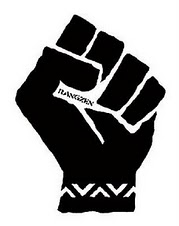
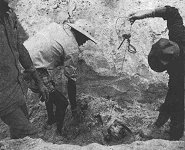


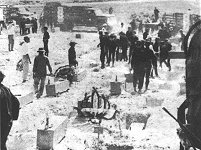
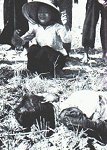
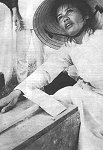
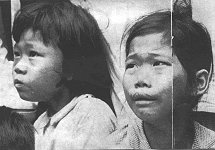
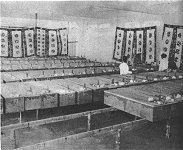
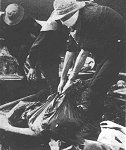

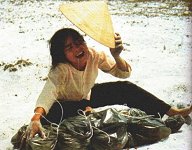
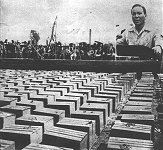
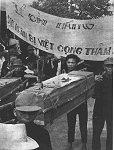
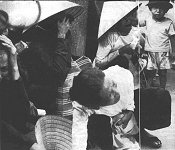
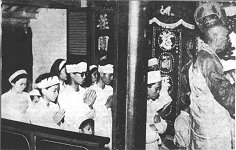

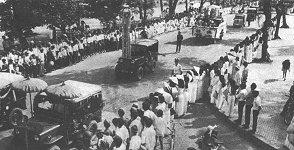
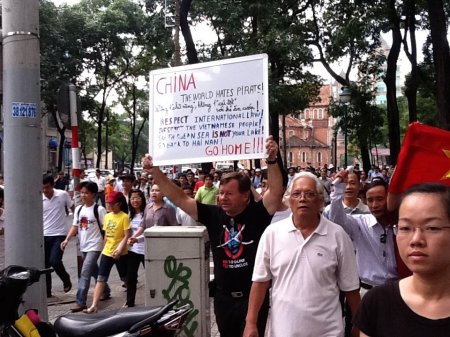
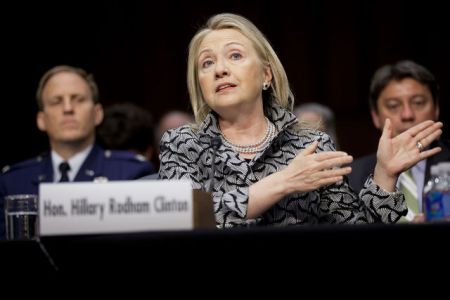
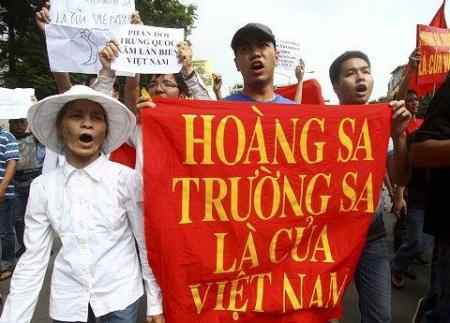











No comments:
Post a Comment